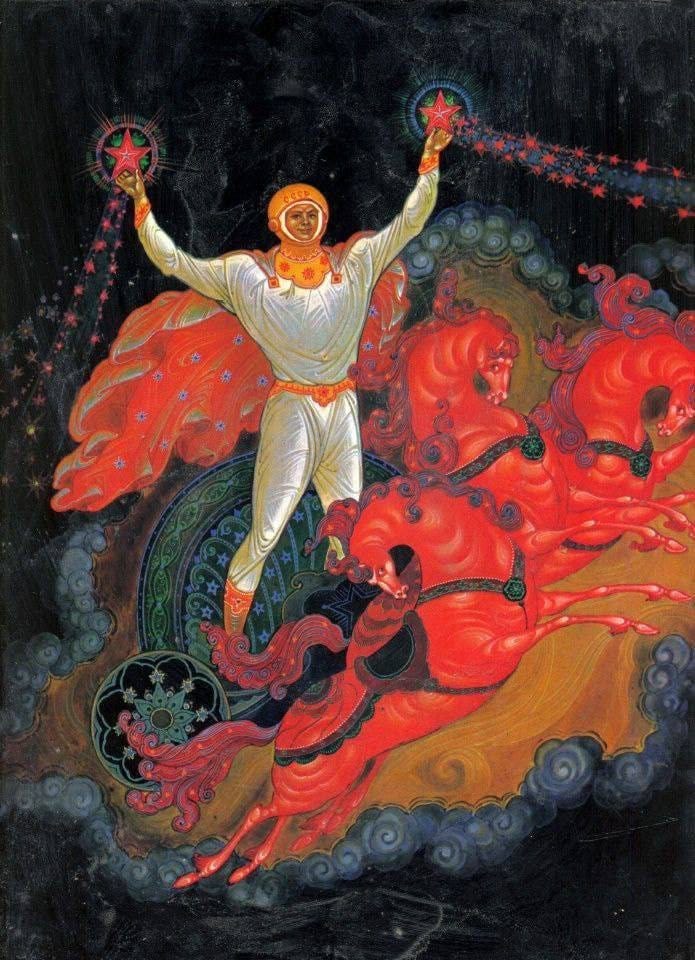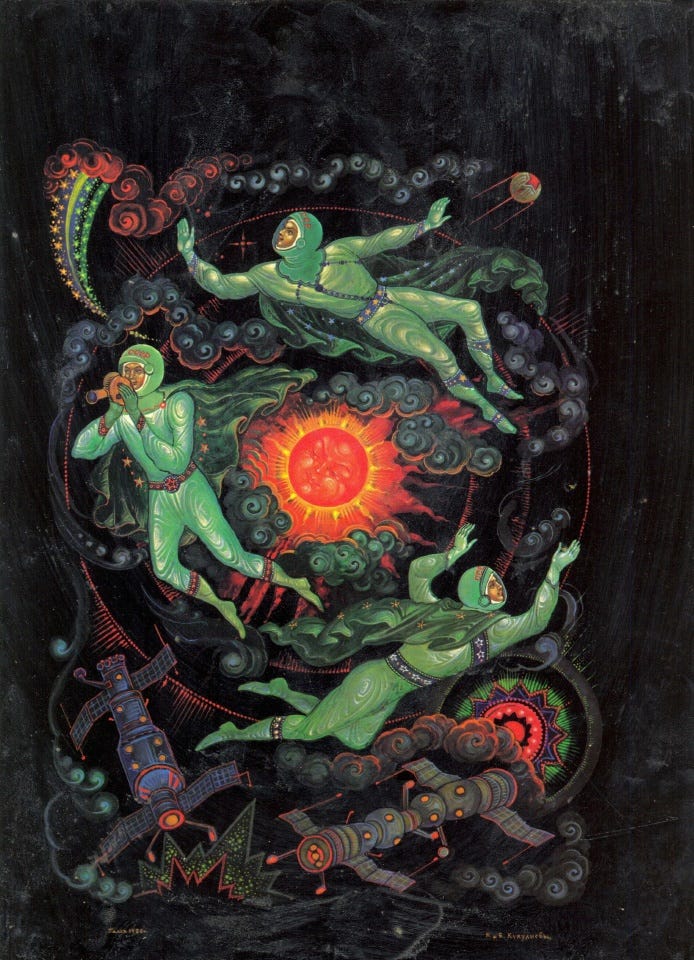Not long ago, on April 12, it was Yuri's night, the anniversary of the first human in space. It passed without much fanfare, as it usually does, unnoticed by global media and most people. Of course, it would be. Ask around - Yuri's dive into the cosmos makes no sense whatsoever. Went first into space, so what? We have so many problems here on Earth!
There is no shared purpose connecting the culture of the current thing to the roots of the longing for space, the deep longing for the beyond stretching back to the first chariot riders to cross the steppe. Don't you know, history has ended; we're in the eternal present now. Both history and the future are problematic now.
There is no more meaning - understood as the ancient Greek telos - connecting the past, present, and future in an organic living experience that could make sense of this longing. For the culture of the current thing, Yuri Gagarin's journey beyond the heavens, into the dark of the cosmos, is just another white man's privilege. Oh wait, are Slavs white now? I lost count.

But forget Yuri and his cosmos for now. Instead, consider the following.
Aeschylus, the father of tragedy and the first titan of theatre, fought as a volunteer hoplite at Marathon and considered this the only achievement worth mentioning on his gravestone. For him, the glory of that one forced night march and magnificent morning charge of the phalanx on the beach at Marathon, the sun reflected in the wave of silver shields, overshadowed all of his art. Can you imagine that? Does this make sense to you?
But wait. Sophocles, the second in the trinity of theatre titans, served as a volunteer hoplite and rose to a general's rank alongside Pericles in the Athenian war against Samos. Meanwhile, Euripides, the third theatre titan, served as a volunteer hoplite in the Athenian army during the Peloponnesian War. Did they coordinate this, one wonders?
Meanwhile, the great Socrates served as a volunteer hoplite in the same war and distinguished himself at Potidaea, Delium, and Amphipolis. During the panicked Athenian rout at Delium, he stayed back to cover his unit's retreat and saved Alcibiades' life. The magnificent Alcibiades, the likes of whom we haven't seen since the Renaissance, later became a student of Socrates.
The great Plato, another student of Socrates, was first famous as an all-Greek pankration champion. In modern terms, that makes him a mixed martial arts UFC champion, though it is a UFC without any rules, where competitors fight and often die in games celebrating the old gods. Moreover, we only know him by his nickname - platos, meaning 'broad' - suggesting that he must have been a truly imposing presence. How does this make you feel?
Then there is Xenophon, another student of Socrates, who fought as a hoplite mercenary in the expedition of the Ten Thousand deep into Persia and Asia Minor, later describing his adventures in the legendary Anabasis. Enough.
All these men lived and fought in the same glorious century. Not coincidentally, theirs was the zeitgeist to invent the root telos (purpose) of Western civilization, its fundamental myth of the future. Aristoteles, a student of Plato, would later describe this myth as eudaimonia, or human flourishing. It was to last, with minor variations, until modernity.
The same spirit that drove Aeschylus to value risking his life at Marathon more than all his work drove Xenophon's hoplites to march into the unknown and stick together, despite all, until the sea. Thalassa! The unbounded sea was their cosmos. The same spirit that drove Plato to become a champion fighter drove him to study with the Pythagoreans in Italy, the priests in Egypt, and the magi in Persia. The drive of the spirit to flourish beyond all boundaries.
Before you say these were entertainments peculiar to the ancients, did you know that Cervantes - he of Don Quixote fame - was at Lepanto, the most important naval battle in history, as a volunteer in the tercios of Don Juan de Austria, on his flagship the Real. He was there at the thick of battle, in the most savage close-quarter butchery, when the janissaries of Ali Pasha broke through and boarded the Real. He was there when the tercios repelled the attack and, in turn, boarded Ali Pasha's flagship, the Sultana. Amid this madness, decks covered in blood, screams filling the air, acrid smoke filling the lungs, he got a musket shot to his chest, point blank, but somehow survived. After recovery, on his way back home, he was captured by the Barbary pirates and spent five years as a slave. This is where Don Quixote came from. How does this make you feel? Do you think he would have done it again?
Today, these are just forgotten stories. Like random sheets torn from a lost book, no greater meaning to connect them to. With the onset of the Industrial Revolution and the relentless onslaught of the machine age, in a final rebellion, the German Romantics added the Faustian Spirit as the last twist to that telos. When Goethe's Faust says, "What you don't know is the only thing you need to know, and what you know is useless to you," he becomes the ultimate expression of the ancients' eudaimonia, the flourishing that strives to know and overcome all, in all directions.
It was during the fin de siècle that our culture saw the last of this spirit embodied in great artists, thinkers, and writers, in the likes of Jack London, Hemingway, Junger, and Saint-Exupéry. Junger was the quintessential warrior through and through; London and Hemingway tried to be and do everything daring all at once, and Saint-Exupéry volunteered as a fighter pilot, writing on the side. Perhaps there were more.
The Faustian Spirit died stomped in the mud and blood of the two world wars, ushering in the End of History and The Last Man - Western civilization as we know it today. An ersatz civilization built around a cargo cult of the eternal present. A cult of comfort, consumption, and safety. A sunset administered by an outsourced answering machine.
Where are we today? To get a proper perspective, imagine if the likes of Derrida, Foucault, and Baudrillard were first famous as veterans of the French Foreign Legion, becoming celebrity philosophers only as a hobby in their later years.
Imagine Foucault returning from his military adventures in Indochina, having risen to a colonel rank, and writing Discipline and Punish while recovering from the wounds received covering his unit's retreat at Dien Bien Phu.
Imagine Derrida proclaiming the tenets of deconstructionism from the octagon, having won his third UFC championship belt. Perhaps he is a jiu-jitsu master, and that is where his first insight into deconstruction comes from.
Imagine Zizek first earning fame leading a team of catholic mercenaries in the Yugoslav wars, starting to dabble in Lacanian film analysis at night, in the lull of fighting orthodox chetniks.
Imagine Baudrillard starting his career as a fighter pilot, becoming the first Frenchman in space, nearly suffocating during re-entry, and, shaken by the experience, retiring to write Simulacra and Simulations.
Can you not imagine it? Why not? Can you not imagine any modern philosopher or artist as first a warrior or, to give modernity its due, at least a competitor in the Olympics? No? How about imagining them as amateur boxing champions, passionate sailors, obsessed Formula 1 drivers, or simple goat farmers? Still no?
Could it be that the relentless bureaucratization of all life, the total triumph of reason, the complete stratification of all experience into a vulgar nihilism of abstractions peppered with a pinch of privileged guilt and made safe for suburban consumption has made the fully embodied life unlivable?

Back to Yuri. After his flight, Soviet authorities forbade him from diving into the cosmos ever again, worried about the risks of losing him. And the risks were enormous. Only five years after his flight, Komarov's parachutes did not open on re-entry, and his Soyuz capsule slammed into the ground at high speed, vaporizing him instantly. Yuri had that spirit though, that drive for the unbound Xenophon captured so well in the Anabasis, and died the way he would have wanted.
Can we recapture this telos and reforge it for the future, and what would that future eudaimonia look like? It must offer more than mere survival, go beyond existence for the sake of biomass propagation, and be more than the safe medicated consumption of corporate slop. It must be rooted in organic meaning, a continuation of the ancient telos that has brought us so far, a flourishing that takes us into the unbound sea beyond Earth.
Imagine if you could rock up at a spaceport and sign up for a ten-year stint on the asteroid belt. Maybe you'll come back, rich and tired, hands slightly shaking from drilling rocks in low G. Or maybe you won't come back at all - you'll buy an asteroid - millions of them around - hollow it out and become the ruler of a free port city for all those freighters on the way to Callisto.
Maybe you will figure out how to breed goats in space and settle them across the asteroid belt, the way the Spanish did with pigs in the Caribbean all those centuries ago. Only returning to Earth, a beautiful green Earth preserved as the Gaia planet, mother to us all, for a week on the beach or Christmas in the snow.
We can build network states in space. Free cities in the asteroid belt. A Neu-Hohenstaufen empire on the moons of Saturn. Ordo Militaris Stellarum. Martian Technocracy. A neo-Cossack Sich on Io. Sufi mystic colonies on Mercury. Neo-hippie communes on Ganymede. And more.
This is how the Faustian spirit survives. A future worth living for.

